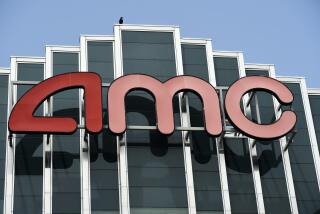Apparently False SEC Filing Sparks Probe
- Share via
BOSTON — The federal government and the New York Stock Exchange said Friday they are examining an apparently bogus claim of a large investment in General Cinema Corp. that triggered a sharp rise in the price of the company’s stock.
Securities experts said the filing by an unknown London man from a fictitious London address of a 6.1% stock acquisition in the soft-drink bottler and movie theater operator raises questions about Securities and Exchange Commission guidelines.
“It’s very disconcerting,” said Sam Scott Miller, a New York securities lawyer. “The system is designed to provide for very speedy dissemination, which is highly desirable to let the public know when someone takes a position. But the incident certainly shows that can be taken advantage of by someone.”
General Cinema, based in Chestnut Hill, Mass., received a brown manila envelope with no return address and a New Jersey postmark late Thursday morning.
Inside was a copy of a letter to the SEC from a Kile Johnasen of 15 Apple St., London, and a copy of a partial 13-D form, required whenever an investor holds more than 5% of a stock. The man said he used “personal funds” to acquire 2.8-million shares of General Cinema worth about $61 million.
Carried by News Service
But London directory information showed no one named Johnasen, and London police told the company there is no Apple Street in the city, General Cinema spokesman Peter Farwell said.
“We thought it was hoax when it arrived here,” he said. “The copy that was made, the fact that it wasn’t a completed 13-D, made us feel it was a hoax.”
But shortly after 2 p.m. Thursday, the Dow Jones News Service carried the report of the filing with the SEC in Washington on its financial wires. Before the company could react, the stock, which opened at $20.875 a share, rose to a high of $23.25 before closing at $21.75. The stock was unchanged Friday.
“It’s a serious matter,” Farwell said. “People are making investment decisions. You want them made on accurate information.”
SEC filings are not reviewed before being made public. Balancing the need to ensure the authenticity of the SEC’s 70,000 annual filings with the public’s right to quickly learn about major stock acquisitions is difficult, securities experts said.
“When a messenger walks in with a filing, how do you know the messenger didn’t print it up in his basement?” asked Ira Lee Sorkin, a former SEC regional administrator now working as a white-collar crime and securities lawyer in New York.
“Filings occur all the time,” he said. “How do you check each one? It’s a very difficult process.”
Respondents Responsible
Sorkin said false filings are “not uncommon,” but typically involve misrepresentation of facts and not outright fiction. Form 13-D filings sometimes are the first sign of a takeover bid and can influence stock trading heavily.
SEC spokesman Chiles Larson said the commission was examining the General Cinema filing.
“If a filing comes in to the commission it’s received by a clerk through the mail,” Larson said. “Clerks are not really securities analysts. The commission holds all respondents responsible for the accuracy.”
New York Stock Exchange spokeswoman Sharon Gamsin said General Cinema had asked the exchange to review the incident “and we’ll certainly cooperate.”
Miller, the securities lawyer, called on the SEC to review its guidelines and impose safeguards.
“I think the SEC and the securities bar should think hard about how safeguards could be implemented without impeding the speed and efficiency of the system,” he said. “In retrospect we’re fortunate this hasn’t happened more often.”
The stock price jump was considered unusual because General Cinema Chairman Richard Smith owns about 30% of the company’s stock, including virtually all of its Class B stock, both of which are needed to approve any change in control.
More to Read
Sign up for Essential California
The most important California stories and recommendations in your inbox every morning.
You may occasionally receive promotional content from the Los Angeles Times.













